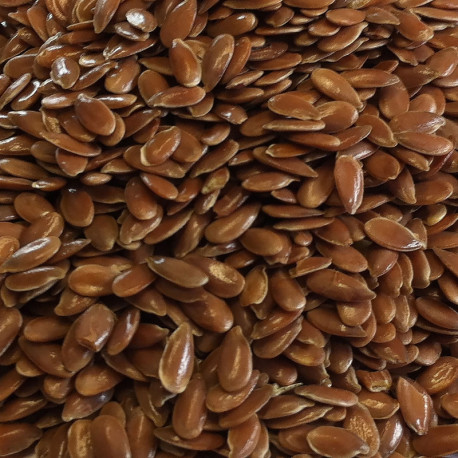



Reference: LIN-KG
The flaxseed consists of 40 to 45% oil and 25% protein. Flaxseed preserves very well. It contains, in particular, two fatty acids with similar names (both derived from the word "lin"), linolenic acid (an omega-3) and linoleic acid.
The seed is used in animal feed, particularly for laying hens for which an increase in the omega-3 content of the eggs is desired.
Due to these properties, this seed aids digestion.
The flaxseed is composed of 40 to 45% oil and 25% protein. Flaxseed keeps very well. It contains in particular two fatty acids with similar names (both having the root "lin"), linolenic acid (an omega 3) and linoleic acid.
The seed is used in animal feed, particularly for laying hens whose eggs' omega 3 content is to be increased.
Due to these properties, this seed aids digestion.
Rowan berry in dried fruit form, which hooked beaks, native birds, and tropical birds are fond of. Use it to enrich your seed mixes or as treats. Dried fruits have a very long shelf life. Use them daily and in every season for a balanced diet to avoid deficiencies.
They have the property of binding to minerals such as calcium, iron and zinc and making them less bioavailable.
Pine seeds are a good source of Phosphorus, Magnesium, Zinc, Manganese, Copper, Iron, Vitamin E, K, B1, B2, B3, B9.
Striated sunflower is the basic seed of any parrot mixture. It is also used in mixtures for parakeets and exotic doves.
It is also the favorite food of your outdoor birds during the winter period! Ideal for feeding the birds in your garden.
Practical information for giving sunflower seeds to birds in your garden:
Remember to regularly clean the feeders of your outdoor birds so that diseases and bacteria do not thrive.
Also consider setting feeders high up to prevent predators (such as cats, foxes, etc.) from targeting birds when they are eating.
These seeds rich in lipids and proteins are especially appreciated by wild birds. They will attract sizerins, reeds, goldfinches, black-headed chickadees, sparrows, sad doves and a host of other birds to your garden. It is often used as a replacement for the more expensive shuttle.
Perilla Blanc seeds contain about 25% fat, 65% of which is omega-3 alpha-linolenic acid, a polyunsaturated fatty acid (AGPI): good fat!
They have the property of binding to minerals such as calcium, iron and zinc and making them less bioavailable.
The shuttle is almost similar to rapeseed, the difference lies in the bitter flavor of the latter. The shuttle seed is rich in protein and favorable to the improvement of song, so it is interesting during the breeding season in canaries. However, as this seed is quite fatty, we advise you not to exceed 10% of your shuttle mixture for colored canaries or posture canaries. For singing canaries, the shuttle softens the song and can therefore be used at 30% of the mixture: in the latter case, we advise you to accompany your bird's diet with liver support.
Turnip is almost similar to rapeseed, the difference is the more bitter flavor of the latter. Turnip seed is rich in protein and favourable to the improvement of song, so it is interesting during the breeding season in canaries.
A type of seed with a mild taste and high protein content. They are also high in fat.
This seed is quite fatty, we advise you not to exceed 10% of your shuttle mix for colored canaries or posture canaries.
For singing canaries, the shuttle softens the song and can therefore be used at 30% of the mixture: in the latter case, we advise you to accompany your bird's diet with liver support.
Thanks to its small black or pretty electric blue seeds, the poppy is recognizable among thousands. A cousin of the poppy, the poppy is known for its content of good fats and micronutrients essential for the proper functioning of the body.
Cardi seed is rich in protein and linoleic acid, which helps lower cholesterol levels and therefore reduce heart disease. It is found in budgie and parrot mixes but also for native birds such as bullfinches.
Cardi seeds are high in fat. The amino acid proportions of the seed are very favourable, the arginine content is very high. The seed is low in lysine and methionine + cystine, while tryptophan is completely lacking.
Baked and crumbled wheat biscuit.
Rusk is particularly suitable for the absorption of moisture in food.
Also ideal for mixing additives (vitamins, dyes, etc.) in food
Ideal for moistening egg pie.
Composition: wheat, water, salt and yeast.
Chicory seeds (cichorium intybus) are part of the health seeds that come from wild plants. These seeds are rich in fibres and minerals and promote intestinal balance.
They purify the body and are also effective in cases of indigestion.
Seeds for canaries and exotic and indigenous birds.
Yellow millet is rich in vitamins and minerals and is an alkaline (non-acidic) cereal. It is part of the basic diet of parakeets, exotic birds and exotic doves.
Millet contains magnesium, phosphorus, iron, potassium, manganese, vitamin A, vitamin B1, vitamin B2, vitamin PP (nicotinic acid) and vitamin B5.

The flaxseed consists of 40 to 45% oil and 25% protein. Flaxseed preserves very well. It contains, in particular, two fatty acids with similar names (both derived from the word "lin"), linolenic acid (an omega-3) and linoleic acid.
The seed is used in animal feed, particularly for laying hens for which an increase in the omega-3 content of the eggs is desired.
Due to these properties, this seed aids digestion.
